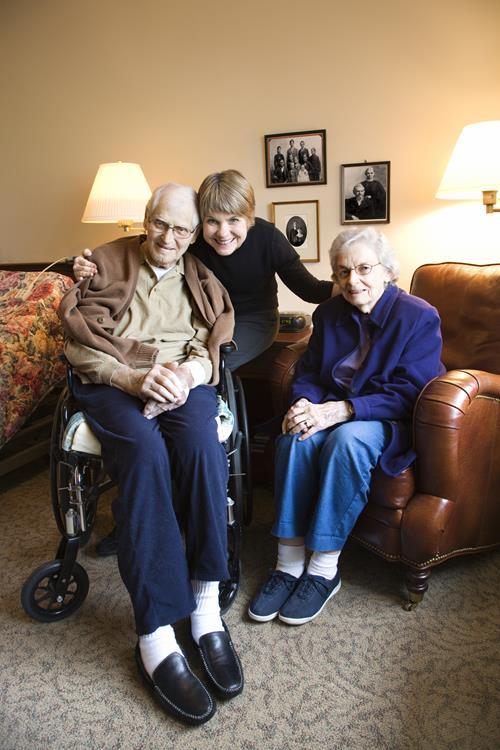
Many of us resist the idea of being dependent on others. We like being able to find our own way and make decisions ourselves. That pattern becomes even more prevalent as people age. More than that, we don’t want to burden the people around us.
This is especially common for seniors. Older parents often become increasingly resistant to the idea of accepting help from anyone, especially from their own family.
In many ways, the idea makes sense. Having children or family members provide support can be demoralizing and frustrating, especially when those family members have full lives of their own.
Yet, as many writers point out – the process of not wanting to be a burden often makes matters worse.
This often creates the situation of stubborn family members, ones that are resistant to all forms of help and support. The process can be frustrating and immensely stressful for the children, as they end up constantly worried about their family member.
And in most cases, the seniors who don’t want to be a burden, end up being exactly that.
For example, an aging parent who consistently refuses help is much more likely to have a fall sooner or later. Likewise, seniors face many more daily living challenges as they age. This can make it dangerous, if not impossible, for them to live alone.
This isn’t just about burden either. We all want our aging family members to be safe, comfortable and happy. In some cases, achieving this may involve going against their desires and wishes, especially in the short term.
So, what can you do?
Aging is never an easy process and each individual situation comes with its own complexities. But, there are some techniques that can help ensure the best outcome for everyone involved.
1. Be Realistic
Being realistic is critical. While every person ages differently, problems typically become more complex as time progresses. New challenges and issues will also arise, often suddenly.
It’s critical to think seriously about what aging means and how things are likely to progress. For example, if the senior is starting to be a risk to themselves (or others) while driving, that situation isn’t likely to get easier over time.
Sooner or later, you may have to make a hard decision, especially if the senior doesn’t want to give up driving. Being realistic and honest can help you do so before there is a serious accident.
In a similar way, it may not be realistic for the senior to keep living at home on their own, especially not in the long-term. This is another topic that needs to be addressed, ideally before any accidents occur.
Part of being realistic is to watch for signs. These can include things like increased isolation, reluctance to go out, disinterest in activities, weight loss or unwillingness to bathe.
Such signs can be an indication that a problem needs to be solved.
A final aspect is making the tough decisions. If it isn’t safe for your family to be at home on their own, you may have to find a solution – even if your family member doesn’t want you to. This isn’t an easy situation and you have to tread carefully. But, that’s where seeking advice and support comes in.
Being realistic is critical, simply because many of us aren’t. It’s easy to ignore the realities of aging when the person is doing fine at that point in time. After all, the topic of aging is linked to end of life and to death. Avoiding that topic for as long as possible is much more pleasant.
But, doing so is a disservice to you and to your family member.
2. Seek Support, Advice, and Education
 Having an aging parent can feel incredibly isolating. But, you’re not alone.
Having an aging parent can feel incredibly isolating. But, you’re not alone.
We have an aging population and there are many people out there experiencing the same or similar challenges. This means that there are also many resources, with more being developed and refined as time goes on.
Talking to other people and finding support can help you figure out the best possible solution for your situation. It can also reassure you that the direction that you’re considering is a good one.
People involved in your family member’s life can help as well. You can even develop a care map to help identify the relationships that are currently present and to find ways to take advantage of these.
There are also many education programs that can support you or your family member. For example, some teach information about how to manage medication effectively and how to get enough nutrients in the diet. Others may address more complex topics, such as end-of-life plans and insurance.
Some of the topics may seem overwhelming or scary. But, as you learn more, your tools increase. As a result, decisions can become easier and you’re more aware of the potential outcomes.
3. Talk About the Hard Stuff
Conversations about aging are tough, they truly are. No one wants to think about not being able to take care of themselves. And, many adults don’t want to view their parents in this light either.
It’s easy to simply ignore the topic and simply live day-to-day.
The problem is that things change, quickly. For example, an accident may decrease your family member’s ability to care for themselves dramatically. In many cases, that change never fully reverses, even once the person heals.
This means that you need to have honest conversations, even if your family member doesn’t want to talk about the topic. This might involve being persistent.
At the same time, be understanding.
Aging is frightening and it’s no wonder that seniors are resistant. If you can figure out what the underlying issues are, you start to find good ways forward, perhaps ones that you both agree on.
You may also be able to show them that them accepting help is actually easier for you. It certainly means less stress. Some seniors may even accept help for that reason alone, rather than admitting that it is something they need.
Feeling Overwhelmed?
Check out our Caregiving Consulting service for personalized support and guidance.

Leave a Reply